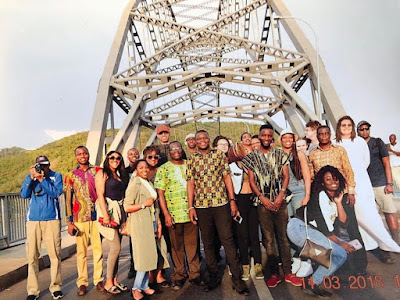A Ghanaian faculty Advisor of
Student Associations of Global Health at FAMU), Dr. Yussif Mijirah Dokurugu,
has said that youth who decide to stay in America illegally undergo various grades
of stress and fear in life.
“You going to the U.S and not coming
back will make you go through a lot of stress and do the meaner jobs; you can make
money, yet you cannot come back home because you do not have documents to
go back to the States again - which is an opportunity you have lost forever,”
he said.
During an orientation session at the
Education-USA office in Kumasi for Kwame Nkrumah University of Science and
Technology (KNUST) students who will be embarking on an exchange programme to
Florida Agricultural and Mechanical University (FAMU) in Florida USA, Dr. Dokurugu
- who is also an Assistant Professor of Epidemiology and Biostatistics, advised
that “It is always good to travel and make sure to return home, and apply again
when the need arises”.
He urged participating students to
take the exchange programme as an opportunity to explore and learn new health
methods and practices which will help grow Ghana’s health systems after the
they have returned home.
“I entreat all students and
participants on the exchange programme to learn as much as they can of the new
trends in health practices and come back to make a change in the lives of
people and the entire society,” he said.
About 26 pharmacy students
from the KNUST and four professional workers will be embarking on the second
edition of the Advance Pharmacy Initiative in FAMU this year.
The exchange programme,
which has been described as an ambitious agenda for deepening bilateral
relations between Ghana and Florida, USA, through health education for
university students, will be targetted at allowing students and participants to
acquaint themselves with current trends in global health care systems.
It will focus on disease
epidemics, modern pharmaceutical practices, cultural exchanges and
environmental issues, and will be aimed at improving the knowledge capacity of
the students about health systems to enable them give back to their country
upon successful completion of the programme.
The lead initiator of the programme, FAMU’s College of Pharmacy, signed a Memorandum of
Understanding with its sister university in Ghana - KNUST - to explore exchange
programmes in the area of pharmacy education for students from both countries
to study abroad, relating to academic and research affiliations.
Dr. Dukurugu, explaining about the initiative,
confirmed that it is an ambitious agenda being explored by the school: “One
that the college is tackling through an academic and cultural exchanges to
broaden the horizons of the next generation of health care practitioners”.
He anticipates that the selected students from both
sides will be offered the chance to get a better understanding of best
practices and systems that are in place in both nations and allow them to bring
back new ideas.
Dr. Dukurugu added: “Overseas study
adventures provide students
with distinct benefits,
as they develop responsibility, initiative and accountability.
“I want them to learn as much as possible to be able
to contribute positively to the health care delivery of every single person
they may come across in their future practices back at home.”
He indicated that the engagement will explore various
areas of collaboration, including student exchange programmes and
partnerships with other celebrated health experts in the United States of
America.
“As the Institute of Public Health within the College
continues to grow, this internship programme will provide an opportunity for
FAMU to cultivate to a diverse workforce of individuals to be able to analyse
public health issues both at home and abroad,” said Dr. Dukurugu.
The programme, he said, has been designed to give the
students first-hand experience in global health issues. It will also provide
them with a spring-board to compete for jobs in the field.
“This will position participating students to be fully
equipped for employment in their selected programmes, governmental and non-governmental
agencies where a knowledge of international systems is pertinent to jobs, even
in the USA,” he remarked.
Marilyn Owusu, Educational Advisor
at the Education USA in Kumasi, said taking the students through various steps
and documentation processes as part of preparation for the travelling visa application
interview indicates that to apply for a student visa, applicants should have
all the necessary documents like any other visa applicant.
She said: “One has to pay a visa fee
of US$160 at any GT Bank branch across the country, fill out the DS-160
form, schedule for a visa appointment online, and pay for Student Exchange
Visitor Processing Fee (SEVIS).
By
Georgina Otoo

No comments:
Post a Comment